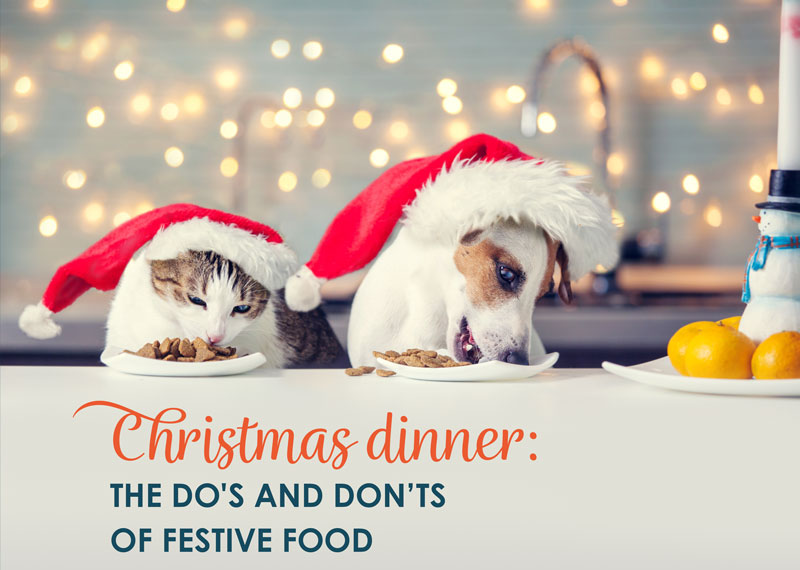According to the PAW Report 2022, 39 percent of dog owners feed their pet a complete dry food diet, and 35 percent feed a mix of wet and dry. But what about Christmas day? You can be fairly sure these statistics go out of the window. After all, with 72 percent of owners considering themselves ‘parents’ to their four-legged friends1, on December 25th, a scoop of dry kibble or a tin of the usual just isn’t going to cut the mustard. Todays pet owners want to include their four-legged ‘offspring’ in all aspects of the festivities and that includes festive food.
According to the Veterinary Poisons Information Service (VPIS), 20 percent of all chocolate poisonings reported to them, occur in December.

The real deal
Stocking your shelves with an array of tempting Christmas pet food is one thing, but some owners will be set on offering their pampered pooch a ‘proper’ Christmas dinner. So what should you advise? Being a font of all knowledge is a great way of gaining customer trust and when it comes to Christmas dinner, it is handy to know what is okay to feed dogs and cats.
Or perhaps more importantly, what is not…
Naughty list: the top five
There are some foods that are non-negotiable and should never be on the pet menu, Christmas Day or otherwise.
1. Grapes, raisins and sultanas
Grapes, whether fresh or dried are toxic and so are off-limits to our four-legged friends. That rules out a number of festive foods including Christmas pudding, Christmas cake and mince pies.
Ever wondered why grapes are bad news? Well, these festive ingredients can cause kidney failure. The mechanism behind the toxicity is unknown and not all dogs are at risk.
So one dog might be able to eat a whole bunch of grapes with no ill-effects, while a small number of raisins could prove fatal to another. With no diagnostic test to determine which dogs are susceptible and which are not, grapes and their dried products should never be fed to any of our canine friends.
2. Onions
No festive turkey is complete without stuffing but anything containing onions should be off pet menus. Onion toxicity results in haemolytic anaemia, a condition where the body starts breaking down its own red blood cells. Adverse effects may start any time from 12 hours to five days after ingestion, and are potentially very serious. While prevention is undoubtedly better than cure, with veterinary treatment the outlook is good.
3. Alcohol
It is common sense that alcohol should never be given to pets, but care should be taken that they do not have a sneaky lap when no one is looking. Cream-based alcoholic drinks can be particularly popular with cats and should be kept well out of feline reach. Depending on alcohol content, as little as 25 millilitres could be fatal for an average sized cat.
4. Salt
Care should be taken with seasoning, especially salt. Gravy in particular, can have quite a high salt content. Of course it’s not just food that should come with a warning – salt dough modelling clay is sometimes used for making homemade Christmas decorations, and it is not unheard of for dogs to snaffle one when backs are turned.
Salt poisoning upsets the body’s water and electrolyte balance, resulting in dehydration and in severe cases, kidney failure.
5. Chocolate
No discussion of toxic treats would be complete without mentioning chocolate. According to the Veterinary Poisons Information Service (VPIS), 20 percent of all chocolate poisonings reported to them, occur in December. Toxicity is due to the theobromine content; dark chocolate has the highest levels and the most serious effects, followed by milk chocolate. White chocolate contains no theobromine and so presents limited risk of toxicity.

Fatty food
Festive food is not always known for having healthy credentials, and food with a high fat content is best avoided. While not strictly toxic, fatty food can cause problems ranging from mild digestive upset to much more serious conditions like pancreatitis. Turkey skin is often high in fat, as are those Christmas dinner staples, pigs in blankets.
The nice list
It is not all bad news. In dogs or cats with no underlying health issues or dietary sensitivity a modest amount of turkey meat and some vegetables are unlikely to cause problems. However, moderation is key. Too much of a food that is not the norm, may well end up in digestive upset, something everyone wants to avoid on Christmas night!
Hard to resist
With price rises and a cost of living crisis, the current financial climate is challenging for all, and retailers are no exception. However when it comes to juggling tight household budgets, today’s pet parents often prioritise their four-legged friends and make savings elsewhere.
According to one study,2 impulse buys account for between 40 percent and 80 percent of all purchases and they peak in the run up to Christmas. With British consumers spending as much as £21.7 billion on these impulse purchases every year, creating an eye-catching festive display to showcase Christmas gift ideas and festive treats is a great way of tapping into this market and increasing basket spend. From Christmas themed snacks and pet-safe ‘chocolate’, to pet-friendly festive meals and even advent calendars, make sure your shelves are stocked with Christmas treats for all tastes and budgets.
According to one study, impulse buys account for between 40 percent and 80 percent of all purchases and they peak in the run up to Christmas. With British consumers spending as much as £21.7 billion on these impulse purchases every year…

References
1. Mars Petcare (2021) Pet therapy: The Retail Opportunities of the Pandemic Pet Boom 2. Amos, Clinton & Holmes, Gary & Keneson, William. (2013). A meta-analysis of consumer impulse buying. Journal of Retailing and Consumer Services. 21. 10.1016/j.jretconser.2013.11.004.

